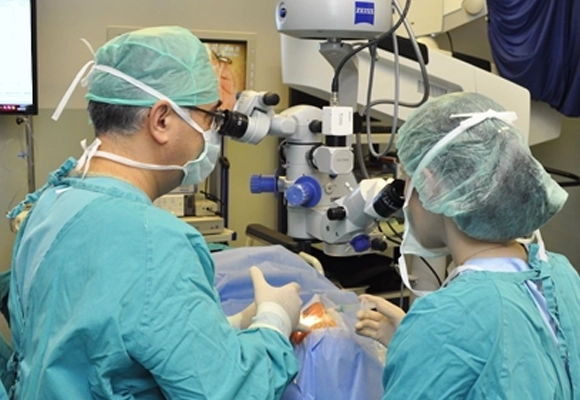


The natural lens inside our eye, along with the corneal layer, allows us to see by focusing the image onto the retina. This focusing enables us to see clearly.
Individuals under the age of forty have lenses in their eyes capable of focusing on every distance. This allows them to see distant, intermediate, and near objects without needing additional help like glasses.
By "distant vision," we mean distances more than 1-2 meters away, while "intermediate vision" refers to the range between 50 cm and 1 meter, which includes tasks like using a phone, viewing a computer screen, or preparing food. "Near vision" refers to distances closer than 50 cm, such as reading a newspaper or book held in hand.
Starting in their forties, people lose the ability to focus on intermediate and near distances, requiring glasses for near vision. Later, in their sixties, the lens of the eye also begins to lose its transparency.
Our clear lens gradually yellows, then whitens, preventing light from entering the eye. This condition, where the lens loses its transparency and blocks vision, is called a cataract. If a person lives long enough, they will develop cataracts.
Although it is generally a problem of the elderly, cataracts can occur at any age. The most dangerous cataracts are congenital cataracts that develop in newborns in the womb. If these babies are not operated on within a few weeks, severe amblyopia develops, resulting in permanent low vision. Additionally, the use of corticosteroids, certain metabolic diseases, and trauma can cause cataracts in young people.
The deteriorated lens is removed using a special device called a phacoemulsification machine, which dissolves and cleans it. This procedure is done through a tiny incision of 2 mm, roughly the thickness of 2-3 matchsticks. A special lens is then implanted in the eye. The surgery takes about 15 minutes.
It is usually done with just eye drops to numb the eye. Although it is a short procedure, it requires great care as it involves changing a crucial part of the eye. The surgeon's experience, the quality of the devices used, and the quality of the lens implanted are all critical for the patient's vision for the rest of their life. Problems can result in lifelong vision loss. Therefore, it is a surgery that should not be taken lightly.
Being an intraocular surgery, cataract surgery does carry some risks, although they are very low. The most feared risks are infections and bleeding. Approximately 500,000 cataract surgeries are performed annually in Turkey.
It is impossible to reduce risks to zero in health-related procedures. However, in a clean environment with special HEPA ventilation systems, using single-use materials, and performed by an experienced surgeon with the necessary protective measures and antibiotics for the eye, the risk of losing vision in cataract surgery is less than one in 10,000.
Cataract surgery, while being the most frequently performed surgery in Izmir and carrying very low risks when done according to rules, can pose serious risks for the patient if performed in environments where material quality is low, hygiene rules are neglected, and single-use materials are reused.
Prof. Dr. Ahmet Akman has performed over 20,000 cataract surgeries in his 25-year career. Besides his surgical experience, his scientific studies on cataract surgery, intraocular lenses, smart lenses, and toric lenses have been published in many international scientific journals. He has also contributed to the education of his colleagues worldwide by speaking at numerous international conferences, including the American Academy of Ophthalmology, the American Society of Cataract and Refractive Surgery, and the European Society of Cataract and Refractive Surgeons.
His scientific studies on smart lenses have particularly attracted attention in the US and Europe. You can find detailed information on this topic on various sections of our website.
After completing his ophthalmology training at Hacettepe University, Prof. Dr. Ahmet Akman worked for 23 years at Başkent University, specializing in cataract and glaucoma treatment. Many patients from Izmir and surrounding provinces consult Prof. Dr. Ahmet Akman for cataract surgery.
Due to his love for Izmir and the sea, Prof. Dr. Ahmet Akman plans to serve his patients in Izmir in the future and aims to work in the field of cataract surgery in Izmir.
Didn't find what you need? Contact us today.
Contact Us
Très bonne expérience avec le Docteur Safiye Yilmaz. Je leur ai expliqué que je devais retourner en France le Vendredi donc j’ai réussi à avoir un rendez-vous Mardi. La c{...}
26.03.2024Ich bin mit der gesamten Abwicklung vom ersten Termin bis hin zu der OP super zufrieden. Wer sich für eine Trifokallinse entschieden hat ist bei Frau Prof. Dr. Safiye Yil{...}
22.03.2024Uso gli occhiali da anni, finalmente me ne sono sbarazzato, sono molto soddisfatto, grazie mille / I've been using glasses for years, I finally got rid of it, I'm very sa{...}
21.03.2024